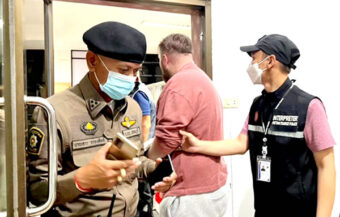Thailand’s economy faces a crisis as business debt soars to 87.6% of GDP, nearing household debt levels, while manufacturing contracts. Struggling firms brace for the impact of a stronger baht, wage hikes, with competition from China intensifying. Not to mention Donald Trump’s tariff plans on all imports to the United States if he is elected.
On Thursday, the head of one of Thailand’s key economic agencies highlighted another critical problem for the economy. In the course of explaining a projected contraction in manufacturing for 2024, Ms. Worawan Chitarun of the Office of Industrial Economics (OIE) underlined the sky-high level of business debt acting like a weight on economic development. In short, this is in addition to household debt. Presently, Thailand’s level of business debt is 87.6% of GDP, nearly the same as the country’s household debt level, which is 90.8% of GDP.

The scale of the economic challenge facing the government was made clear last Thursday. In brief, it came as the Office of Industrial Economics (OIE) issued its revised estimate for production in 2024.
At length, this is measured by the Manufacturing Production Index (MPI). A report was presented by Ms. Worawan Chitarun, the Director of the Office of Industrial Economics (OIE).
In essence, she predicted that Thailand’s manufacturing activity will contract in 2024. The rate should land somewhere between 0 and 1%.
In the meantime, Ms. Worawan provided particularly valuable insight into the situation on the ground for manufacturers.
Thailand’s economic struggles worsened by high household debt and rising loan rejections in key sectors
Certainly, Thai industry has suffered, particularly since the central bank acted to rein in credit and household debt. The top officials quoted a figure prominently estimated at 90.8% of GDP.
In turn, this has led to a significantly higher rejection rate on car loan applications. For instance, the rejection rate on new car loans has climbed to 20%, while those for second-hand vehicles have reached 30%.
However, Ms. Worawan highlights another critical factor when discussing the kingdom’s ailing economy.
In short, in addition to household debt, there is a massive level of business debt. Indeed, this is evident as retail banks have, at this time, ceased all advances and new loans to the small business sector in Thailand.
Small businesses in Thailand close as competition rises and Chinese firms gain ground across sectors
Consequently, firms are closing. Clearly, their misfortune is heightened by cutthroat competition as mobile Chinese firms move in—not only in 25-30 key manufacturing sectors but also now in service sectors such as the critical transport industry.
Ms. Worawan quoted a figure of 87.6% of GDP for business debt. In summary, it is almost the same as the country’s household debt burden again.
In the meantime, capital and financial resources that are available are being directed towards larger corporate lending and government debt instruments.
Simultaneously, Ms. Worawan underscored the effects in recent months of flooding, particularly in northern Thailand. The impact of this has yet to be assessed. Similarly, with the government’s Digital Wallet fiscal stimulus to those on social welfare and the disabled.
Government stimulus and flooding may provide minimal economic relief, but long-term effects remain unclear
In short, this is expected to add 0.3% to the economy. This in turn, means a minimal impact of 0.1% for manufacturing. In short, it is both negligible and short-term.
Furthermore, the government agency head suggested that the U.S. presidential election in early November could significantly impact Thailand.
Economy faces a liquidity crisis as the property and manufacturing sectors nosedive impeding growth
Second Trump Presidency threatens further damage to the baht, the economy and Thai money markets
2nd Trump term would spell a massive shift by the US towards protectionism. It’s called Maganomics
In particular, plans by Republican candidate Donald Trump to impose tariffs on all imports to the United States. The U.S. is the biggest export market for Thai manufacturers.
U.S. tariffs and appreciating baht could challenge Thailand’s industries as wage hikes loom over economy
Such a move, if it happens, could prove extremely challenging for Thailand’s already beleaguered industrial base. At the same time, the rapidly appreciating baht is expected to hamper growth in the final quarter of 2024.
Ms. Worawan noted that Thai firms are already trying to survive in an extremely challenging environment. In addition, the proposed ฿400 minimum wage will further raise the load for struggling firms.
She referred to both the Private Investment Index and the Domestic Business Confidence Index. In summary, the prognosis is not good. Furthermore, the Manufacturing Production Index (MPI) in August 2024 stood at 95.08. This represented a contraction of 1.9% from 2023. Over the first eight months, the index contracted by an average of 1.55%.
Join the Thai News forum, follow Thai Examiner on Facebook here
Receive all our stories as they come out on Telegram here
Follow Thai Examiner here
Further reading:
Economy faces a liquidity crisis as the property and manufacturing sectors nosedive impeding growth
New tax era in Thailand begins as Revenue now shares data with 138 countries within the OECD
Calls for clarification of new Tax regime which appears to target expat foreign income sources
10 year visa a magnet for global citizens setting up in Thailand with zero tax on offshore income
Wealthy foreigners to own small landholdings associated with homes here agreed in principle
New plan for the Thai economy could see an elite foreign visa scheme generate up to 6% of GDP
Economic plan to put the smile back in Thailand’s appeal to western foreigners to live and work
IMF urges government to loosen nation’s purse strings as finances tighten with the tax take down
Plan to allow high tech and skilled foreigners to live and work in Thailand for up to four years


















